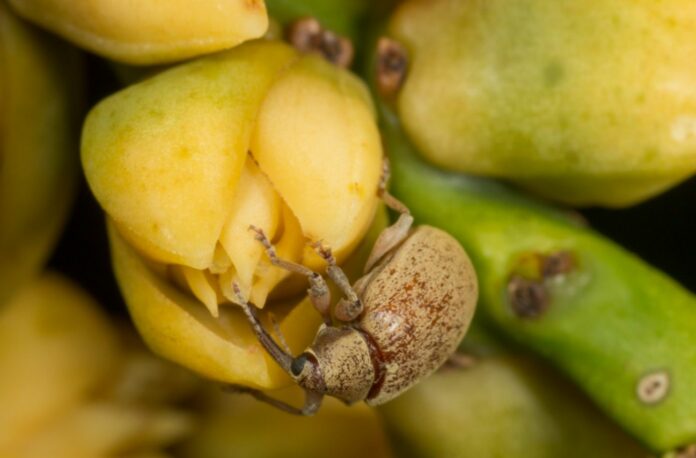Butterflies, bees, and bats are widely recognized and celebrated for their vital role as pollinators. These remarkable creatures journey from one flower to another, gathering sustenance and, in the process, aiding in plant fertilization by spreading pollen.
However, amidst this array of well-known pollinators, there exists a group of highly diverse yet often overlooked contributors: weevils, a type of long-snouted beetle.
Despite their significance, these weevils frequently escape the notice of even the scientific community.
Shedding light on this fascinating subject, a recent study published in the journal Peer Community in Ecology presents an extensive exploration of over 600 weevil species, including those intricately intertwined with specific plants, playing a crucial role in their pollination process throughout their entire life cycle.
“Even people who work on pollination don’t usually consider weevils as one of the main pollinators, and people who work on weevils don’t usually consider pollination as something relevant to the group,” remarks senior author Bruno de Medeiros. “There are lots of important things that people are missing because of preconceptions.”
The Largest Group of Beetles and Their Role as Pollinators
Scientists have identified approximately 400,000 species of beetles, establishing them as the largest group of animals on Earth. Among these fascinating creatures, weevils reign as the most extensive subgroup, comprising an impressive 60,000 species. To put this into perspective, the number of weevils alone matches the combined count of all vertebrate animals. In a recent study, researchers conducted a comprehensive review of numerous published descriptions detailing interactions between weevils and plants. The aim was to gain a deeper understanding of their vital role as pollinators.
Weevils as Pollinators:
While weevils are occasionally regarded as pests, as they can infest pantries and consume pasta and grains, it is worth noting that they also play a crucial role in various ecosystems. Notably, during the early 20th century, boll weevils caused significant disruptions to the cotton industry in the American South by feeding on cotton buds. Nevertheless, it is important to recognize that numerous weevil species are beneficial to plants, particularly as pollinators.
In this work, researchers “focused on brood-site pollinators– insects that use the same plants they pollinate as breeding sites for their larvae,” says de Medeiros.
This particular pollination interaction is unique due to its strong association with high specialization. The insects involved in this process remain closely connected to the plant throughout their entire life cycle, resulting in a tendency to exclusively pollinate that specific plant. Consequently, the plants have developed a dependency on these highly dependable pollinators, leading them to predominantly rely on these particular species for pollination.
Brood-site pollination can be likened to a heightened form of the association observed between Monarch butterflies and milkweed. Milkweed serves as the exclusive food source for Monarch caterpillars and also functions as the preferred site for butterfly egg deposition. However, brood-site pollinators take this relationship to an even more extreme level. Unlike Monarchs, which feed on the nectar of various flowers, brood-site pollinators, such as several weevil species, depend solely on their designated plant companion for sustenance and as a site for laying their eggs.
“This kind of pollination interaction is generally thought to be rare or unusual,” adds de Medeiros. “In this study, we show that there are hundreds of weevil species and plants for which this has been documented already, and many, many more yet to be discovered.”
These closely-linked relationships mean that plants and weevils need each other to flourish.
“Oil palm, which is used to make peanut butter and Nutella, was not a viable industry until someone figured out that the weevils found with them were their pollinators,” adds de Medeiros. “And because people had an incorrect preconception that weevils were not pollinators, it took much, much longer than it could have taken.”
He states that these types of misunderstandings serve as a driving force behind the initiation of the new study.
“We are highlighting a group of insects that most people want to see killed, and we’re showing that they can actually be pretty important for maintaining ecosystems and products that we care about,” he adds. “We hope that by summarizing what we know and providing some pointers on what we should be paying attention to, we can help other researchers and the public to better appreciate the role of weevils as pollinators, especially in the tropics.”
Image Credit: Getty
